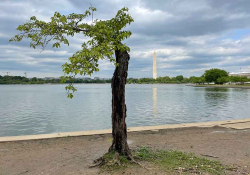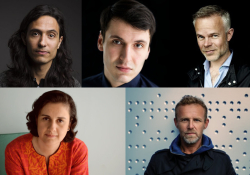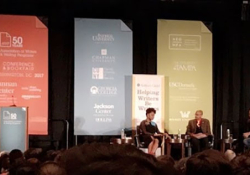From Classroom to Conference: Insights from the American Literary Translators Association Meeting in Milwaukee
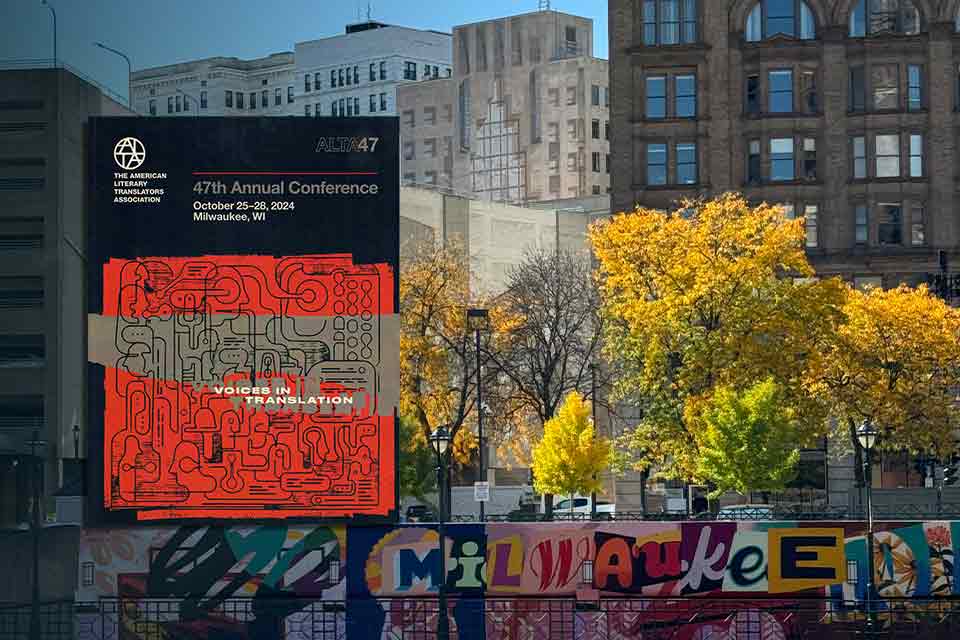
University of Oklahoma student Daria Shchukina recounts her recent trip to the 2024 ALTA conference and the impact it made on helping her further her academic and professional goals.
From October 25 to October 28, 2024, I had the privilege of presenting a panel at the 47th American Literary Translators Association (alta) conference in Milwaukee, Wisconsin. The idea of attending came about during a conversation with Dr. Julie-Françoise Tolliver, my professor for an independent-study course on translation at the University of Oklahoma. Earlier in the year, I had been awarded the Undergraduate Research and Creative Activity Summer Fellowship to conduct research on translating place-based writing. My project focused on translating a short story, “Village Fire,” by Mikhail Saltykov-Shchedrin (1826–1889), an early work that contributed to shaping the village prose genre in Russian literature, which captures the harsh reality and challenges of the Russian peasantry. As one of the outcomes of this project, Dr. Tolliver and I thought that sharing the insights from my research and the complexities of this translation process with a broader audience would be both exciting and impactful.
Beyond the fellowship, my interest in translation has grown significantly through nearly a year of dedicated, self-paced study under the guidance of Dr. Tolliver as part of my independent-study course. Since the University of Oklahoma does not offer formal courses in translation, this independent study has been both productive and fulfilling, however, sometimes it felt a bit isolated, like working in a plant house. Translators on campus are spread across various departments, and I have not had many opportunities to build a network with others who share my passion for translation. I saw the ALTA conference as an ideal opportunity to connect with people who understand the unique motivations, challenges, and creative processes involved in translation—connections that could inspire and nurture my own work and future studies.
After searching for opportunities to present, we discovered that ALTA, one of the largest literary translation conferences in the nation, was still accepting panel proposals. As always, with Dr. Tolliver’s enthusiastic support, we quickly outlined our panel description, “The Challenges and Teachings of Translating Place-Based Writing,” which focused on our understanding of translating literature that is deeply rooted in specific places and connecting narratives of human experience with landscapes of the natural world.
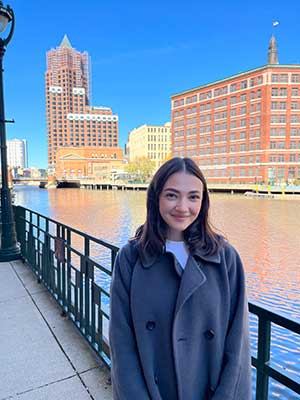
In addition to our own perspectives, we were delighted to invite three more accomplished translators to join our panel. Dr. Kavita Singh, a professor at the University of Houston, specializes in Caribbean literature and works across French, English, and Creole; Dr. Jeannine M. Pitas, a professor at Saint Vincent College, focuses on Latin American literature and translates between Spanish and English; and Shuchi Agrawal, a master’s student in the creative writing program at the University of Cambridge, works with Russian-to-English translations. Together, our diverse experiences and backgrounds offered a well-rounded exploration of translating place-based writing from multiple linguistic and cultural perspectives. Moreover, as an emerging translator and first-time conference attendee and speaker, I was greatly honored to present alongside such talented and experienced writers. This experience allowed me not only to share findings from my research but also to learn from others in the field, gain valuable insights, and expand my understanding of translation in ways I had not even anticipated.
This experience allowed me not only to share findings from my research but also to learn from others in the field, gain valuable insights, and expand my understanding of translation in ways I had not even anticipated.
Since our panel presentation was scheduled for the last day of the conference, Monday, October 28, I was able to attend a variety of other panels and events throughout the weekend. I was pleasantly surprised by the great number of panels scheduled: each day, there were three to four sessions offered, with an average of eight panels running at the same time. Even though all of them sounded fascinating and choosing which one to attend was not easy, all the panels I attended turned out to be incredibly insightful and productive.
One of the panels that deeply resonated with my recent interest in the translator’s voice and contribution to the translated text was “The Development of Narrative Voice in Fictional Writing and Translation.” In this session, three writers and translators—Mauricio Ruiz, Ilze Duarte, and Devanshi Khetarpal—shared their approaches to exploring and developing narrative voices at different stages of both writing and translation. Moderated by Laura Nagle, the panel focused on the collaborative relationship between an author and a translator, a dynamic that plays a significant role in how narrative voices are crafted and conveyed across languages.
Ilze Duarte, a Portuguese-to-English literary translator, made an especially memorable point about the uniqueness of a writer’s voice. She said that one’s voice is similar to one’s fingerprint—it is unique and seamlessly tied to one’s identity. Therefore, all writers have their unique styles and narrative voices, including translators. Duarte used the metaphor of one singer covering another singer’s song to describe the development and visibility of a translator’s voice: although the song may be the same, the cover sounds entirely new, infused with the singer’s unique tone and interpretation. In the same way, a translator brings their own voice to a text, creating something both familiar and original.
Another panel that left a strong impression on me was “Human Translations with Machines: CAT Tools and Literary Translations.” In this session, presenters Lola Rogers, Steven Capsuto, and Viktorija Bilić, moderated by Shelley Fairweather-Vega, introduced the audience to a variety of computer-assisted translation (cat) tools and programs. These tools provide a range of practical features designed to assist the translation process without compromising the translator’s own originality and creative judgment. CAT tools provide functions such as data-crunching capabilities, glossary management, time tracking, assistance with formatting, and more, which translators can incorporate into their workflow for added efficiency and support.
One particularly interesting point discussed was how CAT tools can benefit translators working with genres like fantasy, where authors frequently create unique terms and phrases. For example, a translator can use the glossary feature to save newly discovered terms, which the CAT tool will then recognize and suggest when they reappear in the text, helping maintain consistency and accuracy throughout the translation. This function alone could be invaluable in genres with complex world-building and recurring invented terms, easing the cognitive load and freeing up the translator to focus on the nuanced aspects of language and style.
Between panel sessions, ALTA hosted a variety of engaging events designed to encourage networking and foster connections among attendees and presenters. These included Travel Fellow Reading sessions, where 2024 ALTA Travel Fellows shared excerpts of their winning translation works, and Bilingual Reading Sessions, at which translators presented passages in both the original language and English, showcasing their craft. There were also lots of beverage breaks throughout the day and receptions in the evening, which provided more relaxed settings for meeting new people, catching up with other attendees, and having casual conversations. One of these events was “Cold Beer, Cold Readings,” where volunteers could practice cold readings of short scenes from plays that were translated by ALTA attendees. Each event I attended offered an inviting environment for translators to meet, share experiences, and discuss their work, enhancing the conference’s sense of community.
The peak of networking took place at the ALTA book fair and the Publishers’ Open Mic event, where representatives from numerous publishing houses gathered to showcase their translation-focused presses and journals. Some of the featured publishers included Zephyr Press, Two Lines Press, Other Voices of Italy (ovoi), Ugly Duckling Presse, Eulalia Books, White Goat Press, and Yale University Press. Each representative shared valuable insights on their submission requirements, the types of translations they were currently seeking, and the languages they frequently publish. Afterward, I had the unique opportunity to introduce myself and speak with many of them at the book fair, where each press showcased recently published books and issues. Zephyr Press and Ugly Duckling Presse stood out in particular, as both publishers work with Russian translations, which aligns well with my interests and language focus. Meeting these publishers and discussing the nuances of getting a translation published made me feel more at ease and confident that it is achievable. Many also emphasized the importance of finding “your” publisher, someone who will connect with your voice and narrative without asking for extensive rewrites or changes, which left me feeling more hopeful.
Coming to a large conference where every attendee is celebrated as a translator, an original voice, and a creator profoundly reshaped my understanding of the craft and its value.
Attending the ALTA conference was a pivotal moment in my academic journey and a major coming-out-of-my-shell experience. As a senior preparing to apply for graduate programs in literature and translation, the ALTA conference provided an essential foundation for testing the waters and determining if this field is the right path for me. Coming from a community where translators often have been viewed as “re-writers” to a large conference where every attendee is celebrated as a translator, an original voice, and a creator profoundly reshaped my understanding of the craft and its value. Connecting with people who understand and share the same passion is invaluable, and I encourage every student out there to seek out similar opportunities.
Finally, I want to express my deep gratitude to World Literature Today, the office of the Vice President for Student Affairs, and the Dodge Family College of Arts & Sciences for funding and supporting my trip—this experience would not have been possible without their generosity. I also want to extend my sincere thanks to Dr. Tolliver for always believing in me, supporting my ideas, and sharing these experiences with me.
University of Oklahoma

